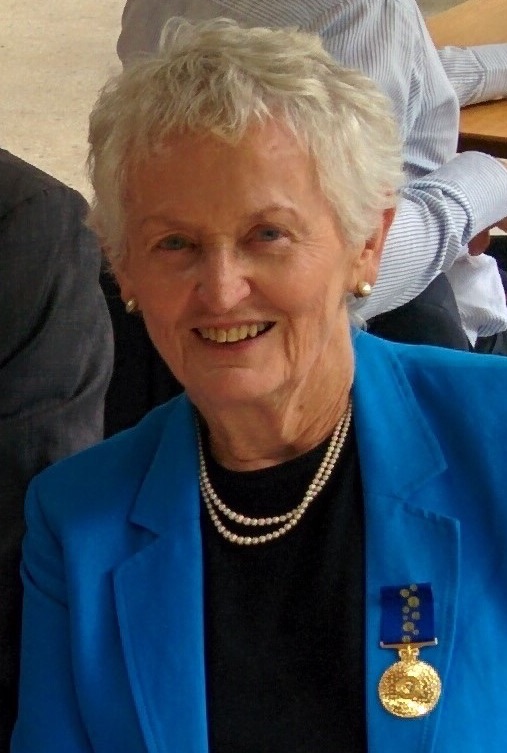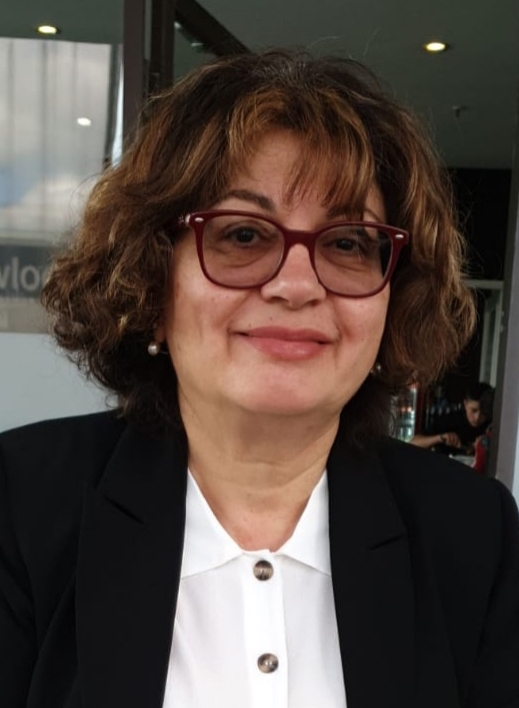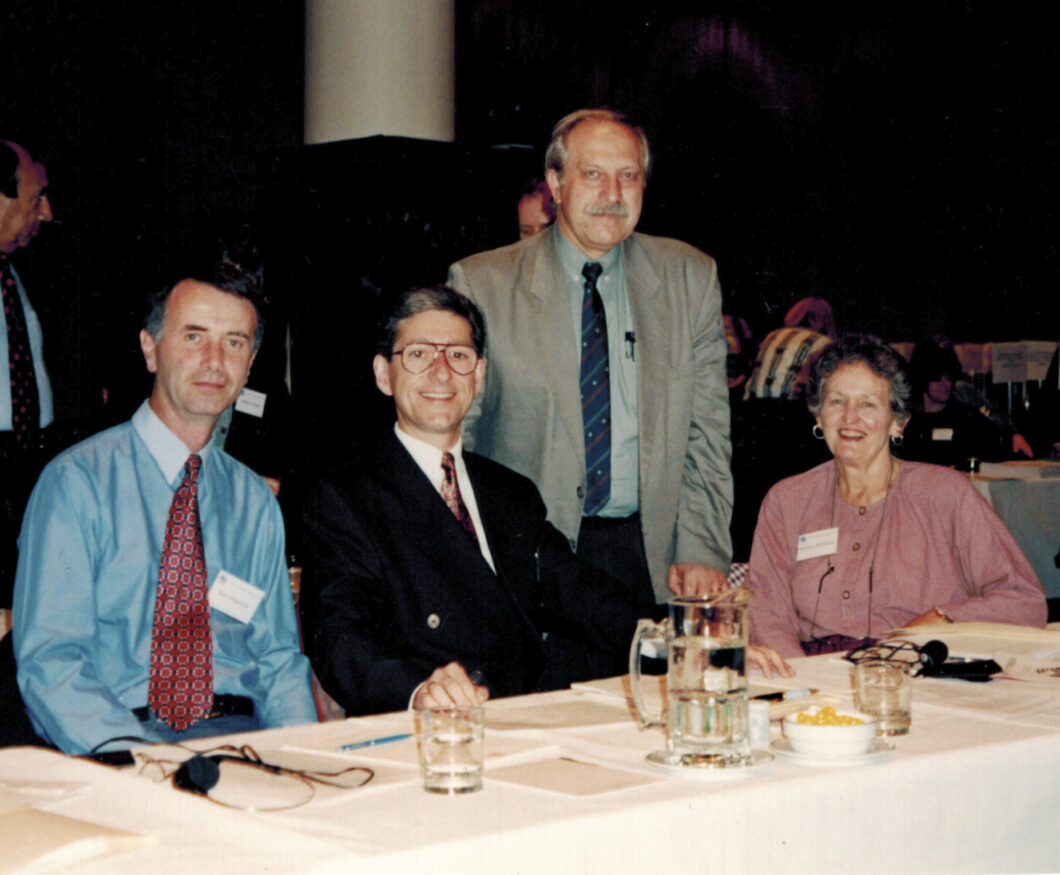INTERVIEW SERIES
In Touch is starting a series of interviews with longstanding AUSIT members who have made significant contributions to the organisation and/or the T&I profession over many years. To kick off the series, AUSIT Fellow Amale Hourani interviews a ‘fellow Fellow’ and foundation member of AUSIT, Barbara McGilvray OAM BA MA FAIIT.


‘… Italy was and remains my spiritual home.’
Amale got to know Barbara at AUSIT social events that were held in Leichhardt, Sydney in the 2000s.
Amale: Could you tell me about your early life, and what set you on a path towards becoming a translator?
Barbara: In my family there is no history of languages other than English: I’m from Scottish, Northern Irish and English stock, and grew up in the (in those days) very white, Anglo-Celtic western suburbs of Melbourne: Ascot Vale, Footscray and Moonee Ponds.
For me the seed was sown in Year 7 (which we called Remove) at Penleigh Girls’ School in Moonee Ponds. We had a lovely French teacher, Mrs Hatton, followed by Madame Ziffer, who I think was Swiss. The two of them inspired a love of languages in me. In my Leaving year (Year 11) I won the Victorian Alliance Française prize for French, and I went on to study French at Melbourne University, which was the only university in Victoria then.
While I was a student the 1956 Olympics were held in Melbourne, and I worked as a waitress for the Olympic Broadcasters’ Club based in Women’s College. That was my initial introduction to other languages and cultures. We had only Anglo teachers at university, and French culture remained foreign and exotic for me until I went to Europe by ship at the end of 1960.
After working at MI5 (the UK’s domestic counterintelligence and security service) for a year (in the canteen, but even there we learned a few secrets …), I hitchhiked around Europe with a couple of friends and ended up getting a job in Rome. I was immediately comfortable with the culture: Italy was and remains my spiritual home.
Amale: I remember fondly those events in Leichhardt, a few people were always at the centre, including Terry Chesher and – behind the scenes – you. We used to pay $22 in cash to attend. Life was simple! What can you tell us about this period in AUSIT?
Barbara: AUSIT was simple then too. It was formed in 1987 (under the auspices of NAATI) as an umbrella association incorporating all the individual state associations (except WAITI in WA, which remained independent; AUSIT started life there as a much smaller branch).
The inaugural National AGM was held at the Sydney Opera House (nothing simple about that, admittedly). There was a small national office in Melbourne, but the branches were largely autonomous and initially managed their own funds. The branch committees came together quarterly via teleconference, with documentation exchanged by fax. We met physically once a year at the NAGM, which was held in a different state each year. I still have meeting minutes, agendas and notes from my years as National Secretary recorded on fax paper. Terry Chesher has some too, but they are all so faded now, they’re well-nigh illegible.
The NAGM weekends were the only national activities we had in those days. That’s apart from the memorable XIVth FIT World Congress we hosted in Melbourne, in 1996 – we spent three years preparing for it under the leadership of Adolfo Gentile,* and a few more years recovering! It was a very exciting time, and ours was judged the best FIT Congress to date.
The state branches organised activities for their members more or less regularly (SA less so as it was very small, and Tasmania only occasionally in conjunction with Victoria; I don’t remember any activities being put on in the NT). They included lectures or panel sessions on a particular topic, and social networking meetings.
Amale: The main topic being discussed at that time was the emergence of machine translation. AUSIT had adopted Wordfast, and it was offered at a discounted price to members. How do you think technology has changed things for AUSIT, and how did you feel about it? Have you adopted technology in your own translation work?
Barbara: Machine translation passed me by I’m afraid. My work has mostly been in literary translation, apart from the bread-and-butter government-related work. For that I had my own templates, as most of us did. Obviously advances in technology have made communication between branches and individuals much easier, and have substantially broadened the PD offering. My own use of technology has remained pretty basic though: Word documents and the usual search engines. I still have shelves full of dictionaries and other references, because I’d rather work with a book in my hands when I can, rather than reading everything on a screen.
Amale: Speaking about change, can you draw a comparison between AUSIT then and now? Have the changes disappointed you? What aspect(s) do you like or dislike the most?
Barbara: I can’t really compare the new AUSIT and the old because the association has moved on and changed beyond recognition, while I’m now in the ‘retired’ category (although I still occasionally work as a literary translator). My only contribution these days is proofreading for In Touch; otherwise I’m just an observer, reading the magazine and the monthly President’s Newsletter with interest. I have no idea about the NSW Branch’s activities, but I hope the Branch committees and the National Council (NC) have the collaborative approach to work and idea-sharing that we had in the old days, and the same camaraderie. I miss those times, but they have given me lots of good memories and enduring friendships.
The 1996 FIT Congress put our association firmly on the international stage (thanks largely to Adolfo – who used his overseas trips as an academic to network on our behalf, and brought results AUSIT could never have afforded or achieved otherwise – and also to Mary Gurgone’s work here at home as then president). Since then, under most of our successive presidents, the organisation has grown substantially in both size and impact, and AUSIT now has an academic focus and influence we wouldn’t have envisaged in the early days – although it actually began with Sandra Hale, who was one of our very few founding student members and went on to become a professor of T&I and an internationally renowned and respected scholar in the field.
For a few years I thought there was too much NAATI involvement in AUSIT, and in fact we lost some of our members due to that perception. At one stage we had to work to correct an assumption among the public that AUSIT and NAATI were one and the same.
For a while, also, there was a belief that AUSIT was a union, and from time to time there have been proposals to make it one. I’m glad we’ve managed to resist those and remain purely a professional association, although I was also pleased to see the establishment of a union for T&Is, Translators and Interpreters Australia, which I imagine is still flourishing.
Amale: From my days on the NSW Branch Committee, I remember that you would check anything and everything before submission.
[Editors’ note: we still rely on Barbara to do this for In Touch!]
You were our safeguard: the silent, fair, genuine person everyone could rely on, consult, and complain to without hesitation. Was this a load on you? How do you describe yourself?
Barbara: And for years you were an amazing, wonderful worker on the NSW Committee Amale. That’s a very nice compliment, thank you, but undoubtedly there were times when I went overboard. I’m still a bit obsessive unfortunately (ask the In Touch editors) … can’t help myself.
[Editors’ note: we’re editors! What’s to dislike about obsessive attention to detail!?]
Most of the time my AUSIT work didn’t feel like a load because I really enjoyed it, and like most of us I wanted AUSIT to prosper. But the obligations did sometimes eat into my family time, and in retrospect I regret that. Hopefully people are not still making that mistake, and the workload is shared around.
Amale: Are there any other aspects of your life or career in T&I that you think would be interesting to our readers?
Barbara: I think most AUSIT members will have interesting lives – it goes with the territory, doesn’t it? I was particularly lucky to be living in Rome in the first half of the 1960s, when life was pretty simple and before the turmoil that began in 1968 when everything changed. There was even still a degree of post-war euphoria about.
And I was lucky to land a job with a Lebanese–American woman who was opening a glamorous office to provide services for the booming film industry: script translation, secretarial services, telephone answering and so on. I was able to learn the language very quickly on the job and immerse myself in the wonderful Italian culture of that time.
Then in the 1970s and ’80s I worked in the Italian Department at the University of Sydney, and one day a publisher came in looking for a translator for a series of cookbooks. That’s how my translation career took off.
Like many of our colleagues I also worked as a translator at the Sydney Olympics in 2000, which sort of closed a circle with my 1956 Melbourne Olympics experience.
Other career highlights include:
- the honour of being appointed one of the three inaugural Fellows of AUSIT in 1995
- teaching translation at UWS, and occasional guest lectures at UNSW and the University of Sydney – I had no training as a teacher, but I enjoyed it because I loved the subject
- working at TIS as an editor under the legendary January Blackbourn, and also for a few years as a community interpreter
- along with Terry Chesher, suggesting and subsequently being part of Jo Lo Bianco’s Languages Advisory Committee to SOCOG (the Sydney Organising Committee for the Olympic Games), and being able to educate many of the stakeholders in matters of language
- receiving the OAM** in 2016, thanks to respected and generous close colleagues including Annamaria Arnall and Moreno Giovannoni, for my then three-plus decades of work with the T&I community
- being part of Moreno’s ‘kitchen cabinet’ when he was president; I recall on one memorable evening during an NAGM weekend in Perth helping Moreno cook a vast pot of pasta for the NC in Mary Gurgone’s kitchen.
Through AUSIT I’ve enjoyed meeting and working with many dedicated, passionate and talented colleagues, including (as well as those already mentioned) AUSIT’s inaugural president Luciano Ginori, a subsequent president Uli Priester (before he went back to Germany), and David Connor, our long-serving and long-suffering national treasurer (not to mention a national treasure) …
Amale: Well that’s all my questions Barbara. Thank you for your time today.
* We are planning to publish an interview with Adolfo in the August issue of In Touch.
** Listen to an SBS Italian interview with Barbara about her OAM here.
If you know a longstanding AUSIT member and would like to interview them for this series, click here to get ‘in touch’ with one of our editors, Helen or Hayley, and we’ll take it from there.
Image: AUSIT delegates to the XIVth FIT World Congress (Melbourne, 1996, organised by AUSIT) from left: Bob Filipovich, the late Klaus Hermes, Adolfo Gentile and Barbara



